Embarking on the Everest Base Camp (EBC) trek is a transformative experience that draws adventurers from around the world. Trekkers will enjoy the captivating culture of the Sherpa people as they traverse the stunning landscapes of the Himalayas, culminating at the iconic base camp situated at an impressive altitude. With well-organized logistics and comfortable accommodations, this moderately challenging trek offers a remarkable journey through Sagarmatha National Park, a UNESCO World Heritage site. Those seeking an exhilarating adventure will be captivated by the breathtaking views of Mount Everest and other majestic peaks that await them along the way.
Good To Know
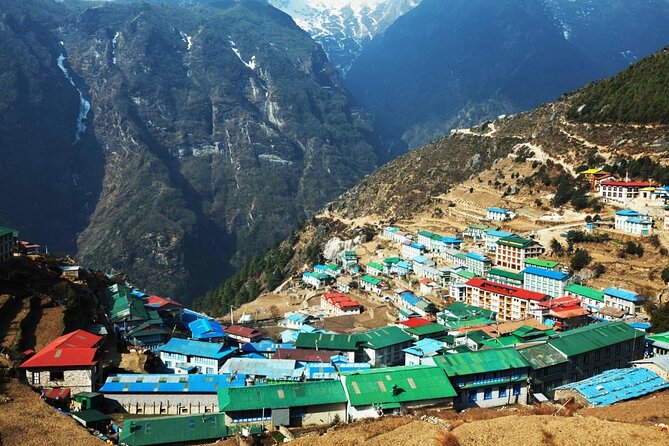
- The Everest Base Camp trek in Nepal offers a moderate-difficulty trekking experience, reaching an elevation of 5,364 meters and featuring stunning Himalayan landscapes.
- The 15-18 day trek is operated by Adventure World Club and includes highlights such as visiting Tengboche Monastery and reaching the iconic Everest Base Camp.
- Proper preparation with essential gear, acclimatization, and adherence to safety guidelines is crucial for a successful and enjoyable trekking experience.
- The trek provides opportunities for culture, interacting with local Sherpa communities, and exploring ancient Buddhist monasteries along the way.
- Capturing the breathtaking scenery and unique moments during the trek requires a durable camera and an understanding of the changing environmental conditions.
Overview of the Trek

Embarking on the Everest Base Camp trek, adventurers can expect a challenging yet rewarding journey through the stunning Himalayan landscapes.
Situated in Nepal, the trek takes trekkers from Kathmandu to the iconic Everest Base Camp at an altitude of 5,364 meters. Along the way, they’ll witness breathtaking vistas of snow-capped peaks, including the mighty Mount Everest.
The trek is rated as moderate, requiring a good level of physical fitness. Operated by Adventure World Club, the Everest Base Camp trek typically lasts around 15-18 days and includes a range of inclusions such as equipment, meals, and permits.
With a 5.0 rating and free cancellation, this trek offers an unforgettable adventure for those seeking to conquer the legendary Everest Base Camp.
Ready to hit more trails? More hiking adventures we feature in Kathmandu
Highlights of the Itinerary
The Everest Base Camp trek offers an exhilarating itinerary that takes adventurers on a journey through the heart of the Himalayas.
The highlights of the trek include:
-
Trekking through the Sagarmatha National Park, a UNESCO World Heritage site, and witnessing the majestic Himalayan peaks, including the iconic Mount Everest.
-
Visiting the Tengboche Monastery, a Buddhist monastery perched at an altitude of 3,867 meters, offering breathtaking views of the surrounding mountains.
-
Reaching the Everest Base Camp at 5,364 meters, where trekkers can marvel at the immense scale of the world’s highest mountain and the bustling base camp community.
The trek is a true test of endurance and determination, rewarding participants with awe-inspiring landscapes and a profound sense of accomplishment.
Preparation and Packing
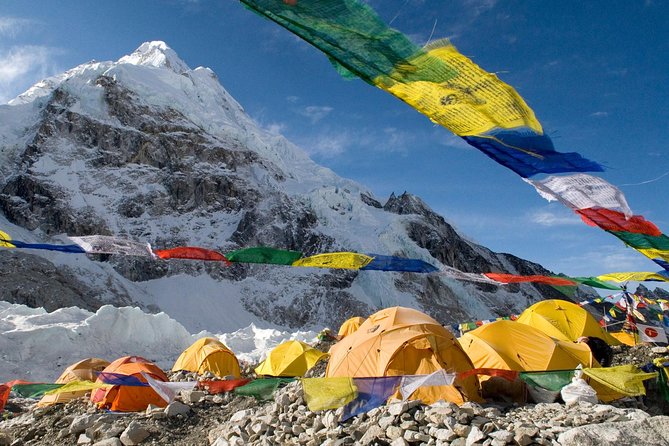
Proper preparation and packing are essential for a successful Everest Base Camp trek. Hikers should pack warm layers, moisture-wicking fabrics, and sturdy hiking boots.
The trek provides trekking poles, sleeping bags, and down jackets, which should be returned at the end. Travelers need a valid Nepal visa, passport photos, and necessary medications.
Acclimatization is crucial, so an extra day or two in Kathmandu is recommended. Ensuring proper hydration and nutrition is vital, and hikers should bring snacks and electrolyte tablets.
Maintaining good hygiene with wet wipes and hand sanitizer is also important. With the right preparation, trekkers can fully enjoy the stunning scenery and challenge of reaching Everest Base Camp.
Transportation and Accommodation
For the Everest Base Camp trek, efficient transportation and comfortable accommodations play a pivotal role in ensuring a seamless and enjoyable journey.
The adventure begins with a pick-up from the international terminal in Kathmandu, where the trekkers are transported to their lodgings.
The trek itself involves a well-organized system of transportation, including:
- Porters to carry the necessary gear and equipment.
- Comfortable teahouses and lodges along the trekking routes to provide rest and nourishment.
- Helicopter services available for emergency evacuations, if required.
These logistical elements work in harmony to create a seamless and memorable Everest Base Camp trekking experience.
Meals and Dining
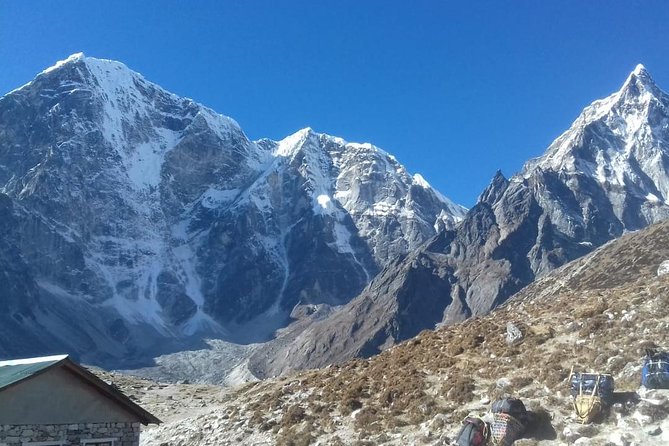
During the Everest Base Camp trek, meals and dining play a crucial role in sustaining trekkers’ energy and well-being. The trek includes 15 breakfasts, 12 lunches, and 12 dinners, ensuring that trekkers are well-fed throughout the journey. The meals are a mix of local Nepali cuisine and international fare, catering to diverse preferences. Trekkers can expect hearty, nutritious meals that provide the necessary calories and nutrients to fuel their arduous hike.
| Meal | Cuisine | Location |
|---|---|---|
| Breakfast | Nepali, International | Teahouses/Lodges |
| Lunch | Nepali, International | Teahouses/Lodges |
| Dinner | Nepali, International | Teahouses/Lodges |
The meals are prepared by experienced local cooks, ensuring authenticity and quality. Trekkers can also find snacks and beverages at the teahouses and lodges along the way to keep their energy levels up.
- Everest Base Camp Helicopter Tour Stop at Everest View Hotel
- Private Kathmandu Sightseeing Tour – UNESCO World Heritage Sites
- Everest Base Camp Helicopter Tour Landing at Hotel Everest View
- 14-Day Private Annapurna Base Camp Trek
- Everest Base Camp Trek-12 Days
- 200 Hours Yoga Teacher Training at Nepal Yoga Home (Starts on 1st of Everymonth)
Health and Safety Considerations
Maintaining proper health and safety is paramount when embarking on the Everest Base Camp trek. Trekkers must be prepared to handle various challenges, including altitude sickness, dehydration, and extreme weather conditions.
The trek includes several precautionary measures to ensure participant well-being:
- Altitude sickness monitoring and emergency oxygen availability.
- Comprehensive medical kits and access to local clinics along the route.
- Experienced guides and porters trained in first aid and emergency response.
Participants are advised to consult with their healthcare providers, acclimatize properly, and follow the guidance of their trek leaders to minimize risks and have a safe, enjoyable journey to Everest Base Camp.
Cultural Experiences
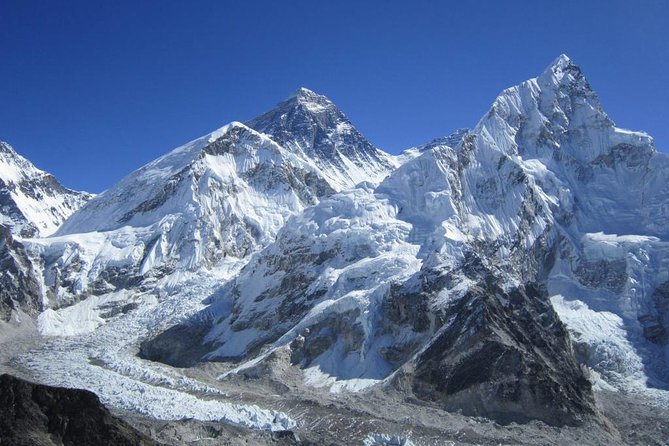
The Everest Base Camp trek provides trekkers with a unique culture, as they traverse through vibrant Sherpa villages and monasteries.
Along the way, trekkers have the opportunity to interact with the local Sherpa people, known for their warm hospitality and rich cultural heritage. Visitors can explore ancient Buddhist monasteries, witness traditional ceremonies, and learn about the Sherpa way of life.
The trek also offers a glimpse into the region’s deep-rooted connection with mountaineering, as trekkers pass by memorials and tributes to the brave climbers who’ve conquered Everest.
This cultural experience enhances the overall trekking journey, providing a deeper appreciation for the Himalayan region and its people.
Trek Photography Tips
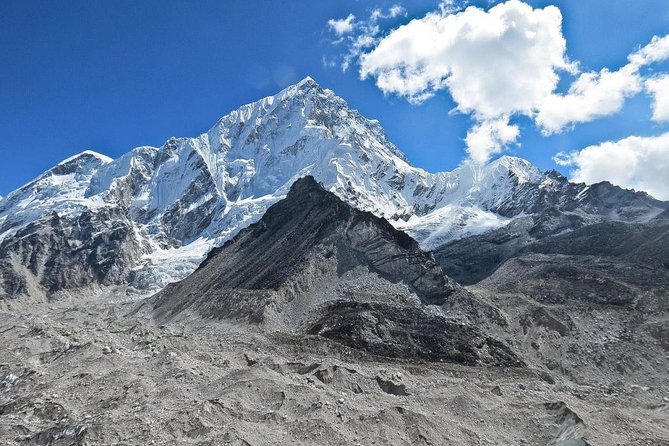
As trekkers embark on the Everest Base Camp journey, capturing the breathtaking landscapes and cultural experiences through photography can elevate the overall expedition.
To enhance your trek photography, consider the following tips:
- Invest in a durable, weather-resistant camera that can withstand the challenging mountain conditions.
- Familiarize yourself with your camera’s settings and functions to quickly adjust to the changing environments and lighting.
- Be mindful of the unique perspectives and compositions that the Himalayan scenery offers, such as dramatic peaks, serene lakes, and vibrant Sherpa communities.
Frequently Asked Questions
How Does the Trekking Permit Process Work?
The trekking permit process involves obtaining a permit from the Nepal Department of Tourism. Hikers must submit required documentation and fees. The permit grants access to the trekking region and ensures compliance with regulations.
What Is the Average Group Size on This Trek?
The average group size on this trek is typically small, around 4-8 participants. This allows for a more personalized and intimate trekking experience as the group travels together through the stunning Himalayan landscapes.
Can I Extend My Stay After the Trek Ends?
Travelers can extend their stay after the trek ends, but this must be arranged separately from the main tour package. Additional costs and arrangements would need to be made directly with the tour operator or accommodation providers.
Is It Possible to Book the Trek as a Solo Traveler?
Yes, it’s possible to book the trek as a solo traveler. The tour is operated as a private activity, so solo travelers can participate. The group size may vary, but solo travelers are welcome to join the experience.
Are There Any Additional Costs Beyond the Listed Inclusions?
Beyond the listed inclusions, there may be additional costs for personal shopping expenses, personal bar bills, personal insurance for helicopter rescue in emergencies, tipping for guide and porter, and any personal expenses such as phone calls, laundry, or phone recharge.
Sum Up
The Everest Base Camp trek is a once-in-a-lifetime opportunity to take in the majestic Himalayan landscape and Sherpa culture. With its stunning vistas, challenging terrain, and well-organized logistics, the trek offers an unforgettable adventure for outdoor enthusiasts. Whether you’re seeking an adrenaline-filled journey or a chance to appreciate the natural wonders of Nepal, the EBC trek is a truly remarkable experience not to be missed.
More Hiking & Trekking Tours in Kathmandu
More Tour Reviews in Kathmandu
Not for you? Here's more things to do in Kathmandu we have recnetly reviewed
- 2 Best Guided Tours In Jagat
- 20 Best 2 Day Tours In Kathmandu
- 20 Best 3 Day Tours In Kathmandu
- 20 Best 4 Day Tours In Kathmandu
- 8 Best Dining Experiences In Kathmandu
- 20 Best Full-Day Tours In Kathmandu
- 25 Best Helicopter Flights And Tours In Kathmandu
- 25 Best Helicopter Flights And Tours In Kathmandu
- 13 Best Massage And Relaxation Services In Kathmandu
- 5 Best Photography Experiences In Kathmandu
- 8 Best Dinner Tours In Kathmandu
- 17 Best Lunch Experiences In Kathmandu
